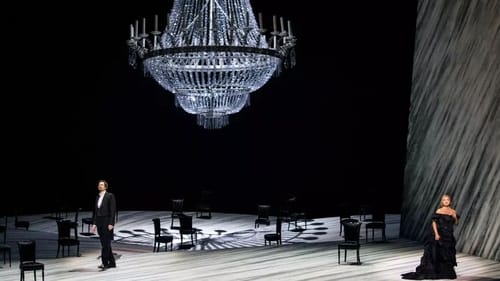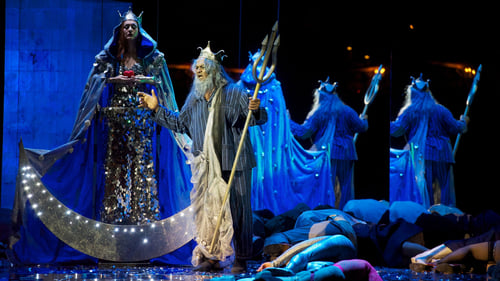
Serguei
Of Shostakovich’s initial undertaking – a trilogy on the tragic destinies of Russian women through the ages – only one opera was ever written: the hard-hitting Lady Macbeth of Mtsensk. Although one of the mainsprings of the work, the Shakespearean parallel is here bitterly ironic: unlike Lady Macbeth, Katerina Ismaïlova who, in the remote reaches of rural 19th century Russia, falls in love with one of her husband’s employees and is finally forced to commit suicide, is less a manipulator than a victim of a violent and patriarchal society. Krzysztof Warlikowski liberates all the subversive power of this scorching and scandalous work, which marked the early years of the Opéra Bastille.

Lenski
Inspired by Pushkin's masterpiece of Russian literature, Tchaikovsky’s opera provides a sublime portrait – both ironic and sympathetic – of a character embittered by society life, rejecting love out of vanity, killing his friend the poet Lenski out of pride and spending the rest of his days in abject despair. A repertoire classic, Willy Decker’s streamlined production makes the Paris Opera echo once more to the strains of Russian romantic music. Edward Gardner conducts an exceptional cast including Peter Mattei in the title role and Anna Netrebko as Tatiana.

The argument is based on an historical case. In the suburbs of Moscow, reigned around 1571 Tsar Ivan IV, 'the Terrible'. Widowed, he is looking for a new wife for the third time. He chooses the young Marfa; she loves another man but bends to the will of the Tsar and renounces her love. From this starting plot, the Russian director Dmitri Tcherniakov retains only the frame. A live competition is organised for a virtual monarch like in a reality show called «Joe Millionaire » where competitors attempt to marry a rich man. Here, the characters become the various players of the audiovisual industry bringing an acerbic criticism of contemporary TV. Daniel Barenboim conducts the Staatskapelle Berlin, with Olga Peretyatko, Anita Rachvelishvili and Johannes Martin Kränzle. Recorded at Staatsoper, Im Schiller Theater Berlin, in October 2013.

Iolanta is a one act lyric opera, sung in Russian, by Tchaikovsky. Performed in the style of a nineteenth-century Italian melodrama, the scenes have a recitative introduction followed by a single arioso, aria, duet or chorus. Persephone is a three act melodrama, sung in French, by Stravinsky. It is a story of regeneration, symbolised in Sellars use of dancers from the Cambodian dance company, Amrita Performing Arts. Peter Sellars, one of the most innovative creators on today's stage, has linked these two productions by using the same stage setting, instantly archaic yet modern, and lit by rich colours to define the journey from darkness to light.

The prince
Antonin Dvorak’s next to last opera draws its substance from the underwater wonderland of little mermaids, Undines and Melusines: the water nymph Rusalka falls hopelessly in love with a prince and, although she is willing to sacrifice her voice to acquire the human form she needs in order to stay with him, the disparity between them proves to be too great. Jaroslav Kvapil’s libretto inspired Dvorak to compose a masterpiece, a compelling opera full of poignant lyricism and dramatic twists. Ádám Fisher and Stefan Herheim masterfully presented this ‘lyrical fairytale’ at La Monnaie in 2008. In this widely acclaimed interpretation, the fairytale elements sometimes assume frighteningly realistic dimensions so that one might see this enchanting production as a psychoanalytical study of male fantasies and female archetypes.

Max
In a village community that holds firm to archaic customs, the young hunter Max must pass a marksmanship test so he may marry his sweetheart, Agathe. Of all times now when his shooting has been very much below par! Carl Maria von Weber and his librettist Friedrich Kind fluctuate between ghost story, fairy tale, fortune play and interplay between heaven and hell.





